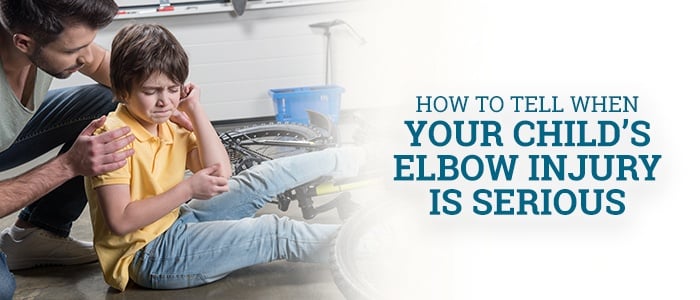
Kids have a way of getting into all kinds of mishaps. Whether it's a fall from the monkey bars or trampoline, a collision playing sports or simply wrestling with the dog - elbow injuries are common with children. They can involve three bones: the humerus (upper arm), the radius and the ulna (forearm). Unfortunately, injuries that occur near the elbow may often require surgery.
Here's how to tell if your child's elbow injury is serious.
Home treatment with RICE (rest, ice, compression and elevation) plus over-the-counter pain medication can relieve minor aches and pains for a strained or "bumped" elbow.
However, serious elbow injuries will present much differently. If you child complains of elbow pain after a fall and/or experiences any of these symptoms, it's time to see an orthopedic physician immediately.
- Visible deformity in the area
- Pain in the elbow and forearm
- Tenderness, swelling or bruising
- Discoloration of the elbow or hand (signs that circulation is affected)
- Limited range of motion/ In children, change of normal use (won't use the hand or arm to play with toys or bring food to mouth)
- Numbness, a "tight" sensation or cool sensation of the forearm, hand or fingers (signs of nerve injury)
During the visit, expect your doctor to order X-rays to evaluate if a fracture has occured. Because a child's bones are still forming, your doctor may request X-rays of both arms for comparison. Soft tissue injuries such as ligament strains, sprains or tears can also occur particularly in “hanging” injuries commonly seen in playground accidents. No matter the injury, skilled evaluation can assist you in helping your child to heal as quickly as possible.
Childhood elbow injuries are all-too common and nearly always occur as a result of a fall. In other words, there's no time to waste. Learn more about our convenient walk-in clinics.


